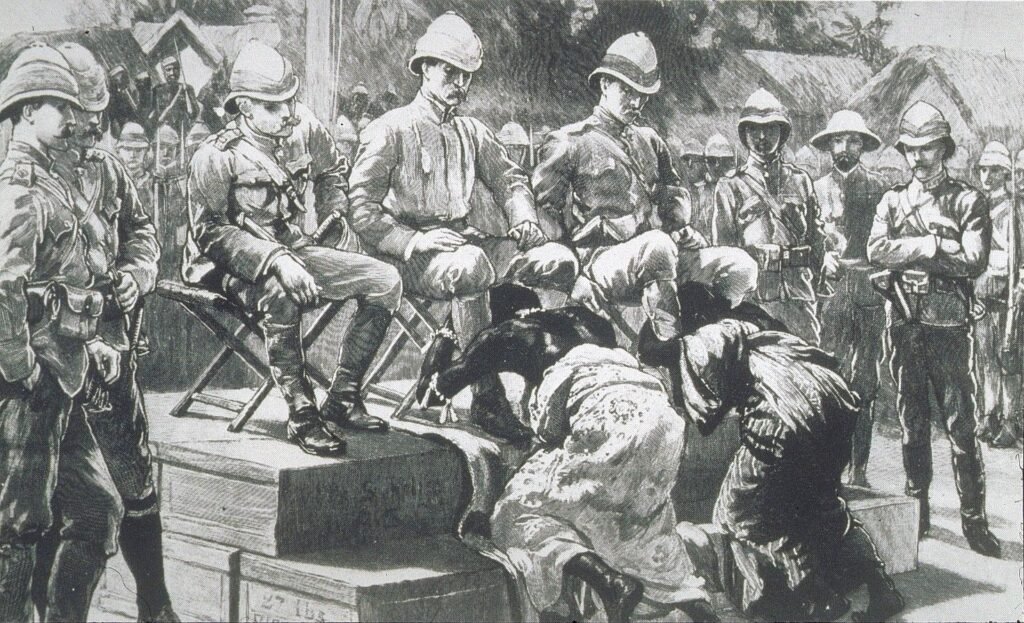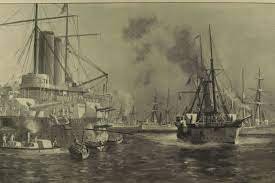The Anglo-Zanzibar War of 1896 lasting for a grand total of 38 minutes holds the distinction of being the shortest war in history. It was a military conflict fought between the Sultanate of Zanzibar and the United Kingdom on August 27, 1896.
While 38 minutes is the most quoted duration for the conflict, different durations are given by different sources, including 38, 40, and 45 minutes due to confusion over what defined the beginning of the war.

There are varying accounts regarding the start and end times of the war. According to some sources, the conflict commenced with an order to open fire at 09:00, while others indicated that actual firing began at 09:02.
Similarly, the conclusion of the war is typically recorded as 09:37, marked by the firing of the last shots and the lowering of the palace flag. However, alternative sources suggest that the war officially ended at 09:45. These discrepancies in time frames have led to differing interpretations of the war’s precise duration.
Causes of the Anglo-Zanzibar War
The roots were laid with the signing of the Heligoland-Zanzibar treaty in 1890, marking a significant moment in the relationship between Britain and Germany. This accord delineated the spheres of influence in East Africa, resulting in Zanzibar falling under British control, while Germany gained authority over mainland Tanzania.
With this newfound influence, Britain asserted its dominance by declaring Zanzibar a protectorate of the British Empire. They installed a handpicked Sultan to govern the region to facilitate their control. Hamad bin Thuwaini, known for his support of the British, assumed this position in 1893, effectively becoming a figurehead under British guidance.
After ruling over the relatively tranquil protectorate for a little over three years, Hamad’s reign abruptly came to an end on August 25, 1896, when he passed away unexpectedly within the confines of his palace. The exact circumstances surrounding his demise remain shrouded in uncertainty, yet a prevalent belief suggests that his cousin, Khalid bin Barghash, played an evil role by allegedly poisoning him.
The suspicion gains further traction due to the swift actions taken by Khalid mere hours after Hamad’s demise. Seizing the opportunity, Khalid swiftly occupied the palace and proclaimed himself Sultan without seeking the approval of the British authorities who held significant influence in the region.
Unsurprisingly, the local British diplomats were far from pleased with this audacious turn of events. Basil Cave, the prominent diplomat in the area, wasted no time in denouncing Khalid’s claim to power and urging him to step down. Regrettably, Khalid disregarded these warnings and instead began amassing his forces in and around the palace.

To the surprise of many, Khalid’s forces were notably well-equipped, even boasting a considerable arsenal of guns and cannons, some of which were initially diplomatic gifts presented to the former Sultan over the years. By the end of August 25th, Khalid had successfully secured the palace with an impressive contingent of almost 3,000 men, several artillery pieces, and a modestly armed Royal Yacht stationed in the nearby harbor.
Simultaneously, the British presence in the region was already fortified with the presence of two warships, namely the HMS Philomel and the HMS Rush, anchored in the harbor. Recognizing the gravity of the situation, troops swiftly disembarked to safeguard the British Consulate and prevent potential riots among the local population. Sensing the need for additional support, Basil Cave, acting as the chief diplomat, urgently requested support from a nearby British vessel, the HMS Sparrow, which promptly arrived in the harbor on the evening of August 25th.
The following day witnessed the arrival of two more British warships, the HMS Racoon and the HMS St George. Notably, the latter carried Rear-Admiral Harry Rawson, who held the command of the British fleet in the vicinity. Concomitantly, Cave received a telegraphic message from Whitehall, authorizing him to take any necessary actions under the full authority of the crown, thus empowering him to handle the emerging crisis effectively.
The Conflict
Basil Cave dispatched the final ultimatum to Khalid on August 26, The ultimatum unequivocally demanded that Khalid vacate the palace premises by 9 am on the following day, leaving no room for negotiation.
The same night, Cave issued an additional directive, ordering the departure of all non-military vessels from the harbor, as a clear indication of the impending conflict. As the fateful morning approached, tension mounted. With a mere hour remaining until the ultimatum’s expiration, Khalid sent a reply to Cave stating, “We have no intention of hauling down our flag and we do not believe you would open fire on us.”

The next day at 9 am, the British fleet anchored in the harbor was ordered to begin their bombardment of the palace. Within a mere two minutes, by 09:02, the overwhelming majority of Khalid’s artillery lay in ruins, and the once majestic wooden structure of the palace began to crumble, trapping 3,000 defenders within its collapsing walls.
Just two minutes after the onslaught commenced, accounts suggest that Khalid made a swift escape through a concealed exit at the rear of the palace, leaving his loyal servants and fighters to valiantly defend the crumbling stronghold alone. By 09:40, the relentless shelling ceased, Sultan’s proud flag was solemnly lowered, and the shortest war in recorded history officially drew to a close after a mere 38 minutes of intense conflict.
Aftermath of the War
The path was clear for the United Kingdom to assert its influence by installing the pro-British Sultan Hamud as the ruler of Zanzibar. Under the guidance and authority of Her Majesty’s Government, Sultan Hamud assumed the throne and commenced his reign, dutifully representing British interests for the following six years.
During the bombardment, an estimated 500 Zanzibari men and women tragically lost their lives or sustained injuries, with many perishing in the ensuing fire that engulfed the palace. It remains unclear how many of these casualties were active combatants, although Khalid’s gun crews were reported to have been significantly reduced in number.
On the British side, casualties were relatively minimal, with only one petty officer severely wounded aboard the Thrush. Fortunately, the injured officer eventually made a full recovery.
While most of the Zanzibari townspeople aligned themselves with the British, the Indian quarter of the town fell victim to opportunistic looting, resulting in the deaths of approximately twenty residents amid the chaotic situation.
To restore order and ensure public safety, 150 British Sikh troops were promptly transferred from Mombasa and deployed to patrol the streets of Zanzibar, mitigating further unrest and assisting in the stabilization of the situation.
General Mathews, the esteemed commander of the Zanzibari army, was bestowed with the prestigious honor of becoming a member of the illustrious Grand Order of Hamondieh on August 25, 1897. This recognition further elevated his status as he assumed the esteemed positions of First Minister and Treasurer within the Zanzibari government, solidifying his influential role in shaping the country’s administration.
Basil Cave, the dedicated consul, received a commendation for his exceptional service. On January 1, 1897, he was honored as a Companion of the distinguished Order of the Bath, highlighting his significant contributions and meritorious actions. His commitment and dedication were further acknowledged when he was promoted to the esteemed position of consul-general on July 9, 1903.
Conclusion
The Anglo-Zanzibar War of 1896 remains a captivating episode in military history due to its extraordinary brevity. Lasting a mere 38 minutes, this conflict serves as a reminder of the dominance of colonial powers during the era. The war’s profound historical significance extends beyond its duration, shedding light on the intricate dynamics of imperialism and the quest
